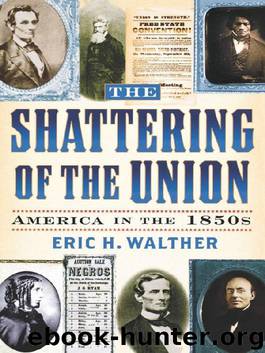The Shattering of the Union (The American Crisis Series: Books on the Civil War Era) by Eric H. Walther

Author:Eric H. Walther [Walther, Eric H.]
Language: eng
Format: epub
ISBN: 9781461666202
Publisher: Rowman & Littlefield Publishers
Published: 2003-10-01T04:00:00+00:00
Millard Fillmore
Library of Congress
Contentiousness reached another high—or low—in party politics as well. The presidential contest of 1856 received its formal debut on February 22—George Washington’s birthday—as the Know-Nothing convention assembled in Philadelphia. It almost immediately split over slavery. Northern members called for a repeal of the Kansas-Nebraska Act; white Southerners demanded that the act be left alone. Many hoped the antidote to their problems lay in nominating a man who could provide unity within both the party and the country. For years, Know-Nothings had courted former president Millard Fillmore. A Whig who never had shared the American Party’s stance on immigration and who had no enthusiasm for anti-Catholicism, Fillmore nevertheless offered impeccable unionist credentials, since he had played a vital role in securing the Compromise of 1850. And Fillmore’s sincere devotion to the Union overrode his serious personal reservations about Know-Nothing bigotry. As he explained to a friend, this party offered the “only hope of forming a true national party, which shall ignore this constant and distracting agitation of slavery.”46 After two days of acrimonious debate on their platform and the withdrawal of many Northern delegates, the American Party did nominate Fillmore along with Andrew Jackson Donelson of Tennessee, a nephew of a more famous former president. On September 17 these same candidates received the nomination of the moribund Whig Party.
On June 2, Democrats held their convention in Cincinnati. The embattled Stephen Douglas faced off against the equally assailed President Pierce, with both Northerners receiving their most severe criticisms from within their own section. For sixteen ballots they struggled, and on the seventeenth both withdrew for the sake of party harmony and unity in favor of James Buchanan. The 65-year-old Pennsylvanian had served his country in so many offices and in such lackluster fashion that he earned the nickname “Old Public Functionary.” But in stark contrast to the liabilities that Douglas and Pierce presented to the North on account of their roles in Kansas-Nebraska, Buchanan had an ace up his sleeve unmatched by these men—availability. Throughout the unfolding horrors of Kansas, Buchanan served distantly and quietly as minister to Great Britain. Having no part whatever in the leading issue of the day, ironically, made him the perfect candidate.
In a conscious attempt not to alienate Northern voters, the Democratic Party platform spoke seldom of slavery. But where it did, it offered great assurance to the Southern portion of the party. It supported popular sovereignty in Kansas and blamed all troubles there on the Republican Party. Pierre Soulé authored two planks promoting slave expansion in Latin America. One supported the efforts of William Walker “to regenerate that portion of the continent,” and the other more generally called for “American ascendancy in the Gulf of Mexico.”47 Both planks won adoption by commanding margins. For vice president the convention selected John C. Breckinridge, a slaveholder from Kentucky, to bring sectional balance to the ticket.
The Republicans gathered in their first-ever national nominating convention in Philadelphia on June 17. Ambitious and prominent party leaders such as Thurlow Weed and William H.
Download
This site does not store any files on its server. We only index and link to content provided by other sites. Please contact the content providers to delete copyright contents if any and email us, we'll remove relevant links or contents immediately.
| Africa | Americas |
| Arctic & Antarctica | Asia |
| Australia & Oceania | Europe |
| Middle East | Russia |
| United States | World |
| Ancient Civilizations | Military |
| Historical Study & Educational Resources |
1861 by Adam Goodheart(1041)
Smithsonian Civil War by Smithsonian Institution(1004)
Abraham Lincoln: A Life, Volume 2 by Michael Burlingame(957)
The Fiery Trial by Eric Foner(934)
Ulysses S. Grant by Michael Korda(924)
Rock of Chickamauga(918)
Battle Cry of Freedom by James M. McPherson(918)
Rebel Yell: The Violence, Passion, and Redemption of Stonewall Jackson by S. C. Gwynne(906)
101 Things You Didn't Know About Lincoln by Brian Thornton(904)
Abraham Lincoln in the Kitchen by Rae Katherine Eighmey(851)
This Republic of Suffering: Death and the American Civil War by Drew Gilpin Faust(832)
Bloody Engagements by John R. Kelso(814)
Union by Colin Woodard(792)
Lincoln's Lieutenants by Stephen W. Sears(790)
Leaves of Grass by Walt Whitman(789)
The escape and suicide of John Wilkes Booth : or, The first true account of Lincoln's assassination, containing a complete confession by Booth(761)
1861: The Civil War Awakening by Adam Goodheart(744)
Rise to Greatness by David Von Drehle(719)
The Fiery Trial: Abraham Lincoln and American Slavery by Eric Foner(719)
